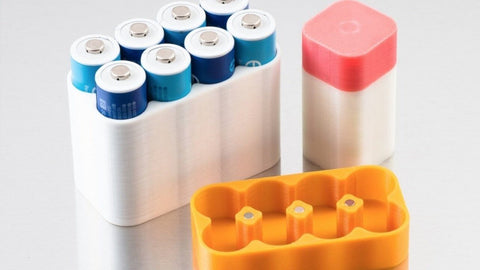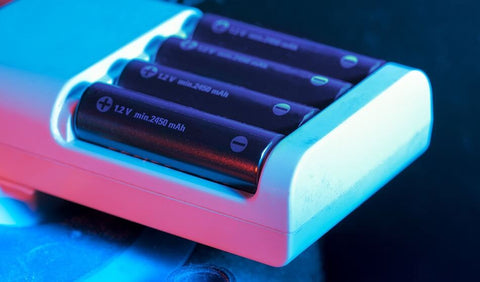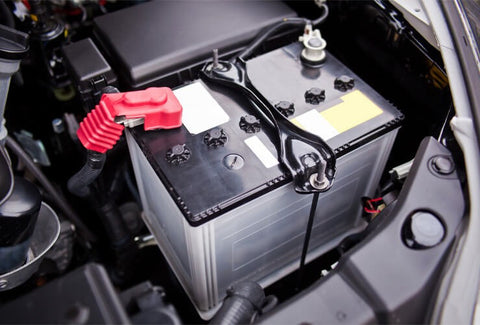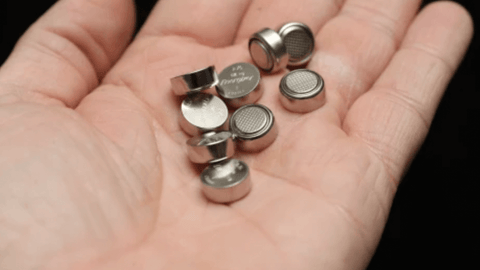
How to Store Batteries Safely + Battery Care Tips?
How to Store Batteries Safely + Battery Care Tips?
Have you ever opened up a device and found old, corroded, leaky batteries inside? Prevent mishaps like these by learning how to store batteries correctly.
Batteries can be hazardous to our health when they are not stored and cared for correctly. Long term battery storage requires specific considerations to ensure that the battery won’t leak, explode, or ruin other batteries. There are also things you can do to prolong the life of commonly used batteries.
We’ve put together a straightforward guide that discusses how to store batteries as well as how to care for batteries while in use. We’ll explain how to dispose of batteries safely, the best place to put them, and some other factors that might be unfamiliar to you.
If you’re looking for specific battery care information, feel free to skip ahead using the links below. Although, you might benefit from reading the entire guide. Let’s get started!

How to Store Batteries
Store batteries in a dry environment at room temperature or slightly cooler. Avoid storing batteries in extreme temperatures that range from hot to below freezing.
Storing batteries in cooler temperatures might lengthen the life of some batteries, but this isn’t necessary for many household batteries.
To prevent leakage or premature power loss, follow these storage tips for different types of batteries.
For household batteries:
- If possible, store one-time-use batteries in their original packaging, so they are not in contact with other batteries.
- If the original packaging is missing, line up like-batteries in a container with all the positive ends facing in the same direction.
- Do not store batteries with the opposing ends touching one another.
- Avoid storing household batteries with other metal objects, like desk staples or loose change.
- Contact with metal can cause the battery to short-circuit, which could then cause the battery to leak.
- Keep batteries of the same type and age stored together. Avoid mixing different types of batteries with varying levels of power. The older batteries can drain energy from the newer batteries.
- Do not remove the plastic caps from 9V batteries until they are in use.
- Make sure the batteries won’t be punctured or crushed while they are in storage. Keep them inside a container that cannot be smashed or otherwise damaged. This tip is especially important when traveling with batteries.
For rechargeable batteries:

- Rechargeable lithium-ion batteries are used in dozens of devices from cell phones to power tools. To keep these batteries in good condition, store them at 40% capacity. Avoid depleting the battery entirely before storage.
- Charge the battery to 100% capacity before use.
- Remove a fully charged battery from a charger as soon as possible. Do not leave your cellphones, laptops, or other devices plugged in indefinitely as this can shorten the lifespan of the battery.
For vehicle and car batteries:

- The best way to preserve a car battery is to use it. When storing a car temporarily, take the car for a spin every few weeks to charge the battery. If you’re storing a car you can’t drive for more than a couple months, consider removing the battery completely.
- To remove a car battery, turn off the vehicle. Next, disconnect the battery by first removing the black cable then the red cable.
- Clean the car batteryto remove any corrosion then store the car battery in a dry location that is cool but will not reach freezing temperatures.
- Consider hooking up the car battery to a trickle chargerto preserve the life of the battery while it’s in storage.
- Read the battery manual for more specific instructions.
Basic Battery Care

It’s important to care for batteries when they aren’t in storage. Batteries that are currently in use are subject to improper handling and can leak, become corroded or otherwise become defective if you’re not careful.
Keep the following warnings in mind when using or disposing of batteries:
- Keep batteries away from children. Coin-shaped lithium batteries are especially hazardous because they are a choking hazard.
- Keep all batteries away from warm or hot temperatures. For instance, avoid leaving devices like laptops inside your car for an extended period. The heat can cause the battery to explode, leak, or become damaged. Heat exposure can also shorten a battery’s lifespan.
- Dispose of used batteries immediately after they stop working. Keeping depleted batteries inside a device can lead to unwanted damage.
- Remove batteries from any device that you are putting into storage and won’t be using for an extended period of time, including remote controls, kids’ toys, etc.
- Remove all batteries once a device stops working. Avoid mixing and matching batteries with different manufacture dates inside a device.
- Never try to recharge a battery unless it is labeled ‘rechargeable.’ Also, only recharge batteries on their designated chargers. There are different types of rechargeable batteries. These batteries are not compatible with all chargers, even if they fit.
- When traveling with batteries, keep spares in your carry-on. If there is an issue with the battery, crew members will be able to address it much faster in the cabin than if you stash the battery in checked luggage.
Frequently Asked Questions

How long do batteries last in storage?
- The quality of new batteries varies depending on who makes them, when they were made and their contents. The lifespan of unused household batteries in their original packaging ranges anywhere from 5 to 20 years in storage. See the manufacturer details for more specifics.
- Several factors impact the shelf life of a car battery. On average, a car battery will last about four years under normal conditions. Some car batteries may last several years beyond that.
How do you properly dispose of batteries?
- Contact your local municipality for instructions on how to dispose of household batteries. You can usually dispose of single-use batteries in the trash, but most areas will encourage you to recycle them. In some areas of California, recycling may be a requirement.
- If a battery explodes, do not touch the battery or acid with bare hands. Instead, put on a pair of latex gloves and carefully remove the battery from the device. Make sure not to touch any skin in the process. Next, dispose of the battery according to local guidelines. Again, some counties allow you to dispose of alkaline batteries in the trash, and others will require you to recycle them at a local recycling center.
- Larger batteries like car batteries and lithium-ion batteries should be recycled and never thrown away in the trash. For car batteries, contact a local mechanic, parts store or retailer to dispose of it properly. For lithium ion batteries, contact your local landfill for a battery recycling drop off point.
Can you store batteries in the refrigerator?
- There is conflicting information as to whether or not storing batteries in the refrigerator makes them last longer. Most battery manufacturers do not recommend storing batteries in the fridge. While the cooler temperature might lengthen the battery life, the moisture from inside the refrigerator could damage the battery in other ways.
- If you opt to keep batteries in the refrigerator, store them inside a sealed air-tight plastic bag. This precaution will help keep the high humidity inside a fridge away from the batteries.
Batteries are expensive, and we require them in so many devices. Keeping them in tip-top shape is essential. We hope these battery storage tips helped you extend the life of all your batteries.


